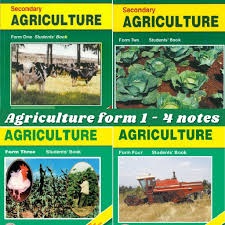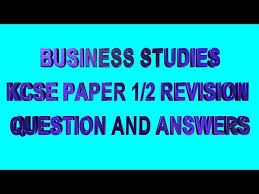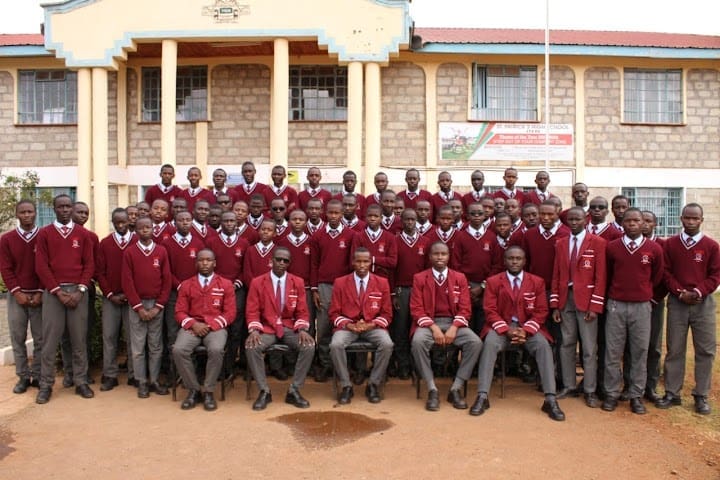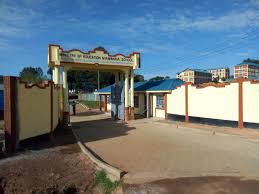ULTIMATE ACHIEVERS ACADEMY
Name: ………………………………………………………….. …Date: ……………Adm No: …………
FORM THREE TERM 2
TIME: 2 HOURS 30 MINUTES
MATHEMATICS
INSTRUCTIONS TO CANDIDATES
- Write your name, class and Admission Number in the spaces provided above.
- The paper consists of two sections. Section I and Section II.
- Answer ALL the questions in Section I.
- Answer only five questions only in Section II.
- All answers and working must be written on the question paper in the spaces provided below each question.
- Marks may be given for correct working even if the answer is wrong.
- Negligence and slovenly work will be penalized
- Non programmable silent electronic calculator and KNEC Mathematical tables may be used except where stated otherwise.
FOR EXAMINER’S USE ONLY
Section I
| Question | 1 | 2 | 3 | 4 | 5 | 6 | 7 | 8 | 9 | 10 | 11 | 12 | 13 | 14 | 15 | 16 | TOTAL |
| Marks |
Section II
| Question | 17 | 18 | 19 | 20 | 21 | 22 | 23 | 24 | TOTAL |
| Marks |
|
SECTION I (50 Marks)
Answer all the questions in this section.
- Evaluate (3 marks)
- By correcting each number to one significant figure, approximate the value of
(788 X 0.006).
Hence calculate the percentage error arising from this approximation (3 marks)
- Three bells ring at intervals of 9 minutes, 15 minutes and 21 minutes. The bells will next ring together at 11.00pm. Find the time the bells had last rang together. (3 marks)
- Solve for x in the equation below (4 marks)
- Without using mathematical tables or calculator evaluate (3 marks)
- Simplify (3 marks)
- The figure below shoes two intersecting chords
Find the length of UT (4 marks)
- Make h the subject of the formula (3 marks)
- Determine the integral values of which satisfy the inequalities below.(3 marks)
- Kambo bought a suit for Sh. 1200 and marked it at a price such that after allowing his customer a 10% discount, he would make a profit of 20%. Calculate the marked price of the suit. (3 marks)
- Given that , without using mathematical table, express in fraction form the value of;
- (1 mark)
- (2 marks)
- Given that evaluate (3 marks)
- On a certain map an estate is represented by an area of 48cm2. If the actual area of the estate is 1200 hectares, find the scale of the map in the form 1:n (3 marks)
- In the figure below ABCD is a rhombus whose diagonals AC and BD meet at X. Given that AC = 27.6cm and BD = 16.2 cm, calculate the area of the rhombus. (3 marks)
- The image of point (6, 4) is (3, 4) under a translation. Find the translation vector. (3 marks)
- The initial cost of a ranch is sh. 5 000 000. At the end of three years the value of the ranch increases to 5 306 040. Calculate to one significant figure the value at which the ranch appreciates. (3 marks)
SECTION II (50 MARKS)
Answer any FIVE Questions ONLY from this section
- Two shopkeepers Juma and Wanjiku bought some items from a wholesaler. Juma bought 18 loaves of bread, 40 packets of milk and 5 bars of soap while Wanjiku bought 15 loaves of bread, 30 packets of milk and 6 bars of soap. He prices of a loaf of bread, a packet of milk and a bar of soap were Ksh 45, Ksh 50 and Ksh 150 respectively.
- Represent:
- The number of items bought by Juma and Wanjiku using a matrix (1 mark)
- The prices of items bought using matrix (2 marks)
- Use the matrices in (a) above to determine the total expenditure incurred by each person and hence the difference in their expenditure. (3 marks)
- Juma and Wanjiku also bought rice and sugar. Juma bought 36kg of rice and 23kg of sugar and paid Kshs 8160. Wanjiku bought 50kg 0f rice and 32 kg of sugar and paid Kshs 11340. Use the matrix method to determine the price of one kilogram of rice and one kilogram of sugar. (5 marks)
- The diagram below represents a steel girder used in construction work. The cross – section consists of a rectangle measuring 20cm by 14cm from which two similar semi – circles have been removed. The girder is 5m long and is made of steel whose density is 8.5g/cm3.
- Calculate:
- The cross – sectional area of the girder. (3 marks
- The mass of the girder in kilograms. (4 marks)
- The removed semi – circular troughs are filled with concrete whose density is 5.5g/cm3. Calculate the mass of concrete used to fill the removed parts of the girder. (3 marks)
(Take π = )
- A country bus left town A at 11.45am and travelled towards town Bat an average speed of 60km/hr. A matatu left town B at 1.15pm on the same day and travelled along the same road at an average speed of 90km/hr. The distance between the two towns is 540km.
Determine:
- The time of the dsy when the two vehicles met. (4 marks)
- How far from town A they met. (2 marks
- How far outside town B the bus was when the matatu reached town A, (4 marks)
- Two lines L1 whose equation is and L2 whose equation is intersect at point A.
- Find the coordinates of point A. (3 marks)
- A third line L3 is perpendicular to L2 at point A. find the equation of L3 in the form , where area constants.(3 marks)
- Another line L4 is parallel to L1 and passes through. Find x and y intercepts of line L4. (4 marks)
- In June of a certainyear, an employee’s basic salary was Ksh 17 000. The employee was also paid a house allowance of Ksh 6 000, a commuter allowance of Ksh 2 500 and a medical allowance of Ksh 1 800. In July that year, the employee’s basic salary was raised by 2%.
- Calculate the employee’s:
- Basic salary in July. (2 marks)
- Total taxable in the July of that year (2 marks)
- In that year, the taxable income tax rates were as shown in the table below.
| Monthly taxable income (Kshs) | Percentage rate of tax per shilling |
| Up to 9680
From 9681 to 18 800 From 18 801 to 27 920 From 27 921 to 37 040 From 37 041 and above |
10%
15% 20% 25% 30% |
Given that the monthly personal relief was Ksh 1056, calculate the net tax paid by the employee. (6 marks)
- In the triangle XYZ below line XY = 3cm, YZ = 4cm and XZ = 3.5 cm.
Calculate:
- Angle ZXY (4 marks)
- Angle XYZ (2 marks)
- Angle XZY (1 mark)
- Calculate the area of the triangle XYZ to four significant figures. (3 marks)
- The 2nd and the 5th terms of an arithmetic progression are 8 and 17 respectively. The 2nd, the 10th and the 42nd terms of the arithmetic progression form the first three terms of a geometric progression. Find:
- The first term and the common difference of the arithmetic progression. (3 marks)
- The first three terms of the geometric progression and the 5th term of the geometric progression. (4 marks)
- The sum of the first 4 terms of the geometric progression. (3 marks)
- By taking integral values of x, from x = – 2, to x=6 make a table of values for the function (2marks)
- On the same axes and using the scale of 1cm to 1 unit on the x-axis and 1cm to 5 units on the y–axis draw graphs of and (4marks)
- From your graph;
- Find the roots of the equations (1mark)
- Write down the maximum value of (1mark)
- Deduce the roots of the equation (2marks)
MATHEMATICS Form 3
MARKING SCHEME
SECTION I
| NO | WORKING | MARKS | GUIDELINES | ||||||||||||||||||||
| 1. |
M1
M1
A1 |
||||||||||||||||||||||
| 03 | |||||||||||||||||||||||
| 2. | M1
M1
A1 |
||||||||||||||||||||||
| 03 | |||||||||||||||||||||||
| 3. |
|
M1
M1
A1 |
|||||||||||||||||||||
| 04 | |||||||||||||||||||||||
| 4. | thus
thus |
M1
M1
A1 |
|||||||||||||||||||||
| 03 | |||||||||||||||||||||||
| 5. |
M1
M1
A1 |
||||||||||||||||||||||
| 03 | |||||||||||||||||||||||
| 6. | M1
M1
A1 |
||||||||||||||||||||||
| 3 | |||||||||||||||||||||||
| 7. | Ignoring negative answer |
M1
M1
A1 |
|||||||||||||||||||||
| 03 | |||||||||||||||||||||||
| 8. |
M1
M1
A1 |
||||||||||||||||||||||
| 03 | |||||||||||||||||||||||
| 9. |
Integral values |
M1
M1
A1 |
|||||||||||||||||||||
| 03 | |||||||||||||||||||||||
| 10. | M1
M1
A1 |
||||||||||||||||||||||
| 03 | |||||||||||||||||||||||
| 11. | (a)
(b) |
M1
A1
A1 |
|||||||||||||||||||||
| 03 | |||||||||||||||||||||||
| 12. | Numerator:
Denominator |
M1
M1
A1 |
|||||||||||||||||||||
| 03 | |||||||||||||||||||||||
| 13. | M1
M1 A1 |
||||||||||||||||||||||
| 03 | |||||||||||||||||||||||
| 14. | M1M1
A1 |
||||||||||||||||||||||
| 03 | |||||||||||||||||||||||
| 15. | M1
M1
A1 |
||||||||||||||||||||||
| 03 | |||||||||||||||||||||||
| 16. |
M1
M1
A1 |
||||||||||||||||||||||
| 03 |
SECTION II
| NO | WORKING | MARKS | GUIDELINES | ||||||||||||||||||||||||||||||||||||||||||||||||
| 17. | (a) (i)
(ii)
(b)
Juma = sh 3560 Wanjiku = sh 3075
Difference = 3560 – 3075 = 485
(c)
|
B1
B1
M1
M1
A1
M1
M1
M1
M1
A1
|
For both answers |
||||||||||||||||||||||||||||||||||||||||||||||||
| 10 | |||||||||||||||||||||||||||||||||||||||||||||||||||
| 18. | (a) (i)
(ii)
(b)
|
M1
M1
A1
M1 M1
M1 A1
M1
M1
A1 |
|||||||||||||||||||||||||||||||||||||||||||||||||
| 10 | |||||||||||||||||||||||||||||||||||||||||||||||||||
| 19. | (a) Time before the matatu started
= 13.15 – 11.45 = Distance covered by the bus = Distance between them = Relative speed = Time taken to meet = Time they met = 1.15pm + 3 hours = 4.15pm
(b) Distance from town A to the point of meeting Time = Distance from A =
(c) Time taken by the matatu from B to A The matatu reaches A = 13.15pm +6hrs = 1915hrs Time travelled by the bus when the matatu reaches A 1915hrs – 1145hrs = Distance moved by bus from A = Distance outside town B |
M1
M1
M1 A1
M1 A1
M1
M1
M1 A1 |
|||||||||||||||||||||||||||||||||||||||||||||||||
| 10 | |||||||||||||||||||||||||||||||||||||||||||||||||||
| 20. | (a)
Solving simultaneously
(b) , (x ,y)
(c)
|
M1
M1
A1
M1
M1
A1
M1
M1
A1
A1 |
|||||||||||||||||||||||||||||||||||||||||||||||||
| 10 | |||||||||||||||||||||||||||||||||||||||||||||||||||
| 21. | (a) (i)
(ii)
(b)
Total tax = 4104
Net tax = = 3048 |
M1
A1
M1 A1
M1
M1
M1
M1
M1 A1 |
|||||||||||||||||||||||||||||||||||||||||||||||||
| 10 | |||||||||||||||||||||||||||||||||||||||||||||||||||
| 22. | (a)
(b)
(c)
(d) |
M1
M1
M1 A1
M1
A1
A1
M1 M1 A1 |
|||||||||||||||||||||||||||||||||||||||||||||||||
| 10 | |||||||||||||||||||||||||||||||||||||||||||||||||||
| 23. | (a)
(b) Geometric progression
(c)
|
M1
M1
A1
B1 B1 B1
B1
M1
M1
A1 |
|||||||||||||||||||||||||||||||||||||||||||||||||
| 10 | |||||||||||||||||||||||||||||||||||||||||||||||||||
| 24. |
2 mks for correct table y = 5 ( x – 2 ) y = 5 x – 10
i) roots of 3 x ( 4 – x) = ) are x = 0, x = 4
ii) Maximum value of y = 3x ( 4 – x ) when x = 2 , y = 12 the maximum value of y = 12
iii) roots of equation 3x ( 4 – x ) = 5 ( x – 2 ) is where the curve cuts the line y = 5 (x -2 ) The roots arc x = -1 and x = 3.3 ± 0.1
|
B1
B1
S1 P1 C1 L1
B1
B1
B1B1 |
Table
üB1 for both values of x |
||||||||||||||||||||||||||||||||||||||||||||||||
| 10 |







